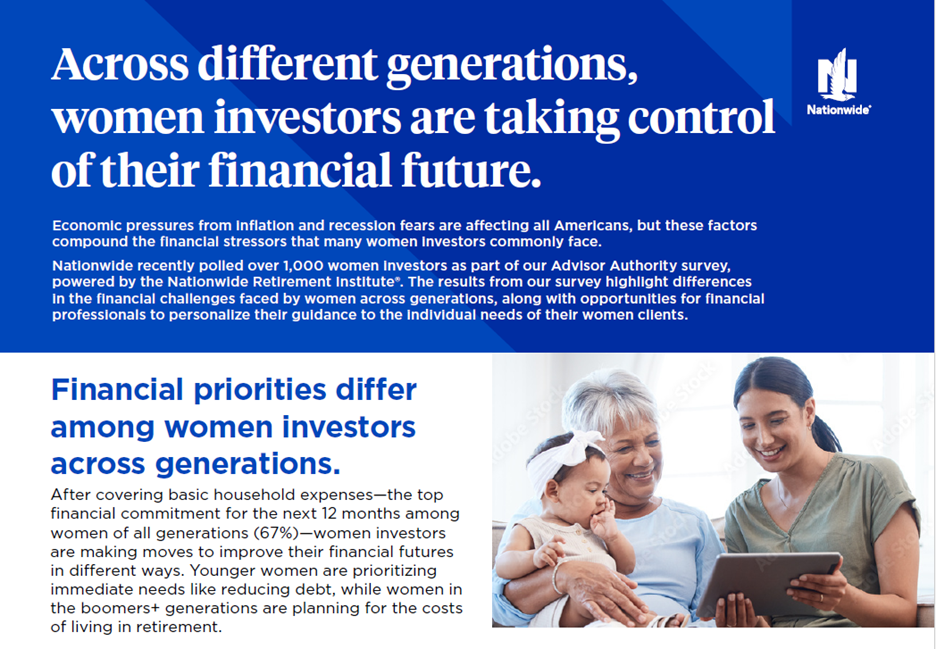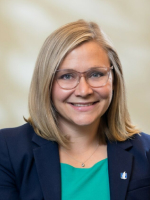Key Takeaways:
- Understanding the unique financial goals and challenges women clients face is key to building lasting trust.
- Financial professionals feel confident in serving and growing their base of women clients.
- Nationwide provides tools and resources to help create personalized financial plans tailored to women’s unique needs.
03/11/2025 – Recently, we polled over 1,000 women investors as part of our Advisor Authority survey, powered by the Nationwide Retirement Institute®, to better understand the challenges women investors are facing.
Our study shines a light on the specific obstacles women investors of all ages encounter, from managing everyday household expenses to assuming caregiving responsibilities for children and older family members. We’re also able to see how women investors in different generational cohorts are processing challenges in their retirement journey differently.
Women express concern over ongoing economic pressures
Over the past few years, many Americans have struggled with the stress of inflation and fears of a potential economic downturn. In our survey, around three in four women investors say they are concerned about a U.S. economic recession in the next 12 months.
Across generations, women investors cited inflation and the increased cost of living as the top long-term challenges to their retirement plans. The strains from rising costs are affecting Boomer and Gen X women more so than younger generations. That may also indicate growing concern among women investors who are near retirement and need to ensure they have enough savings to cover essential expenses.

View the infographic
While survey results like this highlight opportunities for financial professionals to help investors, personal experience can also be valuable in empowering us for the daily work we do on behalf of clients. For me, that experience came while watching my parents plan for their own retirement. As owners and operators of our family farm, this retirement plan came with extra complexity to manage the land transfer and estate taxes along with their own goals and dreams for retirement. They wouldn’t have been able to have the confidence to step back from farming without the help of financial professionals. This gave me a refreshing perspective on the work we do and underscored the sense of purpose we should feel as we help more people realize the dream of a secure retirement.
Economic stress also challenges retirement plans
Nearly three in four women investors between age 18-54 (72%) said their expectations for retirement have changed significantly in the last five years. Additionally, over half of women under 55 (57%) said they have delayed, altered or cancelled their dreams for retirement due to economic conditions over the past five years.
For younger women clients, some of the best guidance they can get from financial professionals is to put time on their side. For Gen Z and Millennial women, there’s enough time between today and retirement to put their financial plans on a path toward greater retirement security. Reducing and eliminating debt should be part of those plans, but it’s also important that women look ahead to retirement and take action to save more now.
When compared with men, women over age 55 report feeling less optimistic and more worried about their financial futures. Among women who are near or already in retirement, 62% said they have re-thought if and when they can retire because of inflation and recession fears. Only 56% of men over 55 said the same.
The impact of caregiving on retirement preparedness
One reason many women investors fall behind on their retirement savings goals is because of caregiving duties. That often means limiting their career plans or placing them on hold. Some women opt or are forced to step out of the workforce altogether. Not only does this result in lost income, it also results in lost opportunities to save for retirement.
The impact of caregiving on women’s income and savings goals is especially acute for Gen Z and Millennial women. They are entering their prime earning years and also have a long-term time frame to invest and build savings for retirement. More than two-thirds of women investors who support children or aging parents say these caregiving responsibilities have impacted their careers. Moreover, another 18% of these women investors say caregiving has prevented them from saving for retirement.
This survey data highlights the opportunity that we as financial professionals have to help women investors turn the anxiety they feel about economic conditions and financial decisions into proactive action in the form of a holistic plan for retirement. Especially when it comes to caregiving obligations, we can help women clients address the specific risks they face and put a plan in place for long-term financial security.
Helping women take steps to secure their financial future
What actions are women investors taking in response to the financial pressures they’re facing? Across all generations of women we surveyed, they’re prioritizing the need to cover basic household expenses. After that, priorities differ. It’s in these difference where financial professionals can personalize the guidance they offer to their women clients to fit where they are now at this stage in life.
Gen Z women are prioritizing immediate financial needs such as reducing debt and paying off loans. Those steps are important, but the youngest generational cohort is also looking to increase how much they contribute to their workplace retirement plans and keep other savings on the sidelines for the right market opportunity.
Millennial and Gen X women are seeking investment opportunities now, in addition to saving more through their 401(k) or other retirement plans at work. They’re also focused on paying down debt and catching up on their retirement savings. Our survey found women in these middle generations are prioritizing these two financial commitments almost equally.
For Boomer women, the emphasis is on cutting back discretionary spending in order to save more for retirement and adopting a more conservative approach to managing their investments. Nearly half of Boomer women surveyed said their top financial commitment in the next 12 months is affording health care costs.
Tailor guidance to all generations of women investors
The concerns of women investors are not one-size-fits-all. Each generation of women investors processes these challenges in different ways, shedding light on opportunities for financial professionals to better serve clients in these groups.
The good news is many women investors are being proactive and discussing these challenges with financial professionals. For their part, financial professionals feel well-positioned to support their women clients as they plan for and approach retirement. Nearly all financial professionals (95%) say they understand the needs of women clients and feel well-equipped to serve them. Furthermore, 92% say they plan to grow their base of women clients in the next 12 months.
The best thing a financial professional can do, whether working with long-time women clients or new ones, is listen. A great way to build trust is to make space for them to articulate the challenges they are experiencing, acknowledge what’s keeping them up at night and share the competing priorities that may be impacting their savings habits. This can lead to a deeper consultative conversation, and eventually a holistic plan tailored to their unique needs.


